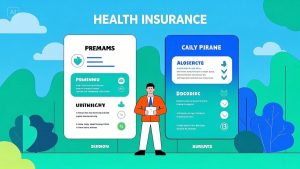
{"aigc_info":{"aigc_label_type":0,"source_info":"dreamina"},"data":{"os":"web","product":"dreamina","exportType":"generation","pictureId":"0"},"trace_info":{"originItemId":"7494241161498938677"}}
Being a single parent comes with a unique set of challenges. Managing a household, taking care of children, and working to provide for your family is no easy feat. One of the most important and sometimes most daunting tasks is securing affordable health insurance for yourself and your children. Healthcare costs can be overwhelming, and as a single parent, it’s essential to find a plan that offers adequate coverage without breaking the bank.
In this comprehensive guide, we’ll explore various options for affordable health insurance for single parents. We’ll dive into the benefits of different types of insurance, tips for lowering premiums, and how to navigate the often-complex healthcare system to ensure your family stays healthy and financially secure.
1. The Importance of Health Insurance for Single Parents
Health insurance is essential for everyone, but it’s especially important for single parents who bear the financial responsibility of not just their own health, but also that of their children. Without adequate health insurance, even a minor illness or injury can result in significant medical bills. For single parents, these expenses can be crippling, and in some cases, prevent them from accessing the care they need.
Here are a few reasons why health insurance is particularly crucial for single parents:
1.1. Access to Preventive Care
Health insurance ensures that both parents and children receive regular check-ups, vaccinations, and screenings. Preventive care can catch potential health problems early, reducing the likelihood of serious, expensive conditions developing in the future.
1.2. Coverage for Emergencies
Whether it’s a sudden illness, accident, or unexpected health issue, health insurance provides the financial support needed for emergency services. For single parents, this coverage is critical to avoid the crippling costs of emergency room visits and hospital stays.
1.3. Ongoing Medical Needs
If your child or you have ongoing medical conditions—such as asthma, diabetes, or mental health needs—having health insurance is vital to ensure that these conditions are managed effectively and affordably. Without insurance, regular visits to specialists and the cost of prescriptions can add up quickly.
1.4. Peace of Mind
Health insurance gives single parents peace of mind knowing that their family will be taken care of if the unexpected happens. This security is especially important when you don’t have a partner to help with the financial burden of healthcare.
2. Health Insurance Options for Single Parents
As a single parent, there are several health insurance options available. The best option will depend on factors such as your income, employment situation, and whether your children qualify for government programs like Medicaid or the Children’s Health Insurance Program (CHIP). Let’s explore these options in detail.
2.1. Employer-Sponsored Health Insurance
If you are employed, your employer may offer health insurance as a benefit. This is often one of the most affordable options for health coverage, as employers typically pay a portion of the premiums.
Pros:
- Lower premiums: Employer-sponsored plans tend to have lower premiums because the employer contributes to the cost.
- Group coverage: You’ll be part of a group plan, which often means lower costs and better coverage options.
Cons:
- Limited plan options: Depending on your employer, you may have limited plan choices, which may not fit all your family’s needs.
- Dependent coverage: Not all employers offer dependent coverage, or it may be expensive to add children to your plan.
If your employer offers health insurance, it’s usually a good idea to explore this option first. However, keep in mind that you may still need to shop around for a plan that fits both your and your child’s needs.
2.2. Medicaid and the Children’s Health Insurance Program (CHIP)
If you have a low to moderate income, Medicaid and CHIP are excellent options to provide affordable health insurance for your children—and in some cases, for yourself.
Medicaid
Medicaid is a federal and state program that provides free or low-cost healthcare to eligible low-income individuals, including single parents and their children. Eligibility is based on factors like income, family size, and other circumstances. In some states, Medicaid is available to all low-income individuals, regardless of whether they have children.
Children’s Health Insurance Program (CHIP)
CHIP provides health insurance for children in families with incomes too high to qualify for Medicaid but too low to afford private insurance. CHIP covers a wide range of services, including check-ups, vaccinations, dental care, and emergency services. Each state administers its own CHIP program, and eligibility criteria and benefits can vary.
Pros:
- Low or no cost: Medicaid and CHIP provide free or low-cost healthcare.
- Comprehensive coverage: These programs cover a wide range of medical services, from preventative care to emergency services.
- No deductibles: Most states have programs that do not require deductibles or copayments for medical services.
Cons:
- Income-based eligibility: These programs are typically only available to low-income families. If your income is too high, you may not qualify.
- State-specific: Medicaid and CHIP eligibility and coverage options vary by state, so you’ll need to check your state’s program for specifics.
If you qualify for Medicaid or CHIP, these programs can be a cost-effective way to secure coverage for yourself and your children.
2.3. Health Insurance Marketplace (Obamacare)
The Health Insurance Marketplace (also known as Obamacare) is a federal program that allows individuals and families to purchase health insurance through government-run exchanges. Marketplace plans are available for single parents who do not have access to employer-sponsored insurance and do not qualify for Medicaid or CHIP.
Pros:
- Subsidies: Depending on your income, you may qualify for subsidies that reduce your monthly premiums.
- Variety of plans: The Marketplace offers a range of plans with different levels of coverage and costs, allowing you to choose one that best fits your needs.
- Tax credits: If your income is below a certain threshold, you may qualify for tax credits that lower the cost of your premiums.
Cons:
- Premiums can still be high: While subsidies help lower the cost, premiums can still be expensive for single parents with higher incomes.
- Limited enrollment periods: You must apply during open enrollment, or you may have to wait for the next period unless you qualify for a Special Enrollment Period.
The Health Insurance Marketplace can be an excellent option for single parents, especially if they don’t qualify for Medicaid or CHIP but still need financial assistance to cover their healthcare costs.
2.4. Short-Term Health Insurance
Short-term health insurance is a temporary solution that provides basic health coverage for a limited time—usually up to 12 months. It’s designed to bridge the gap if you’re between plans or need coverage for a short period.
Pros:
- Affordable premiums: Short-term health insurance plans tend to have lower premiums than other options.
- Quick coverage: These plans can be quickly activated, making them ideal for temporary coverage needs.
Cons:
- Limited coverage: Short-term plans often cover fewer services and may exclude important benefits such as maternity care, mental health services, and prescriptions.
- No guaranteed renewal: These plans are not renewable, and your premiums may increase after the initial term.
Short-term health insurance is not typically the best option for long-term coverage but can be a stopgap if you find yourself in need of temporary health insurance.
3. Tips for Finding Affordable Health Insurance for Single Parents
Securing affordable health insurance can be a challenge, but there are several strategies single parents can use to reduce costs and ensure they have the coverage they need.
3.1. Use Government Assistance Programs
As discussed earlier, Medicaid and CHIP provide affordable health insurance for low-income families. If your income qualifies, these programs can be the most cost-effective way to secure coverage. Even if you don’t qualify for Medicaid, CHIP is available for children in lower-income households and is often the most affordable option for your kids.
3.2. Explore the Health Insurance Marketplace
The Health Insurance Marketplace is designed to help families find affordable insurance options. Depending on your income, you may qualify for subsidies that can significantly reduce your premiums. Be sure to shop around and compare plans to find the one that best fits your family’s needs.
3.3. Consider a High Deductible Plan
A high deductible health plan (HDHP) typically has lower premiums, which can be a great option if you’re healthy and don’t anticipate needing frequent medical care. Just be sure that you can afford the deductible if you do need care. HDHPs are also eligible for Health Savings Accounts (HSAs), which allow you to save money tax-free for medical expenses.
3.4. Look for Family Coverage
Many insurance plans offer family coverage, which covers both you and your children. Buying a family plan can often be more cost-effective than buying separate policies for each person.
3.5. Take Advantage of Tax Credits and Subsidies
If you purchase health insurance through the Marketplace, you may be eligible for tax credits or subsidies that can lower your premiums. Be sure to check if you qualify and take advantage of these programs.
4. Conclusion
Finding affordable health insurance as a single parent can be overwhelming, but there are many options available to help you secure the coverage you and your children need. From employer-sponsored plans to Medicaid, CHIP, and Marketplace plans, there are resources designed to fit a variety of income levels and family situations.
By understanding your options and utilizing the resources available, you can ensure that your family is covered without overwhelming your budget. It’s important to assess your financial situation, compare available plans, and take advantage of subsidies and tax credits to lower your premiums.
No matter your income level or healthcare needs, there’s a health insurance option that can provide peace of mind and financial protection for your family. Take the time to explore your options today and ensure your family’s health and well-being are protected.




